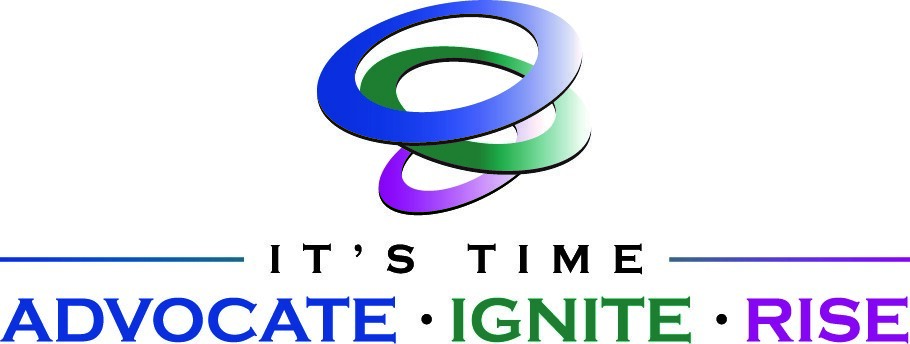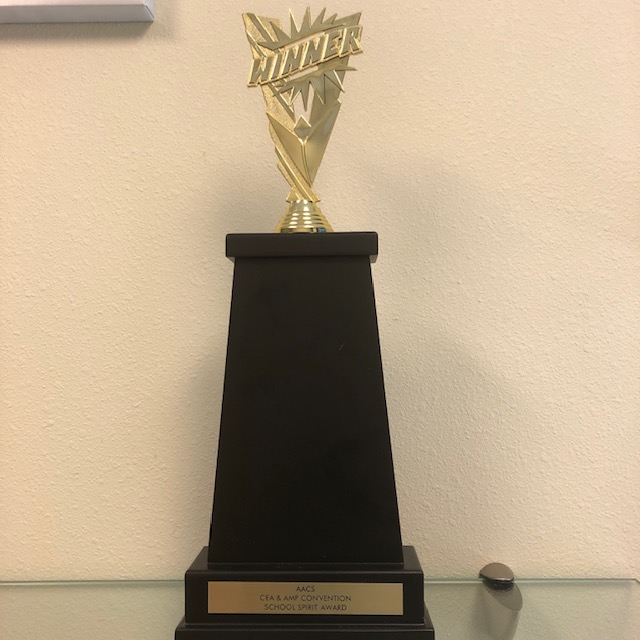 |
| Archive | Subscribe | Printer Friendly | Send to a Friend | www.beautyschools.org |
|
What's Hot
AACS offices will be closed Friday, July 3 in observance of the July 4 holiday. AACS offices will reopen Monday, July 6. 
Register today! Internationally known speakers, top notch training and tools for your beauty educators – this year’s CEA & AMP is an innovation in itself. Check out the schedule for this first-of-its-kind event here. Register to join us July 11-13, 2020. Click here for more information.

Who will take home this trophy? The entries are in and now it’s time for you to pick which school has the most school spirit! Each video should be judged on the following criteria:
Voting ends July 11. Vote today! The Senate is debating the Fiscal Year 2021 National Defense Authorization Act. Senator Durbin (D-IL) has announced that he may attempt to offer an amendment that would change the 90/10 rule to 85/15 (and include veteran and military benefits in the 85). AACS strongly opposes the amendment. We need AACS member schools to reach out to their Senators asking them to oppose this amendment should it be offered. Please act TODAY. This urgent call to action requires each of our member institutions to contact their respective Senator and urge them to vote against Senator Durbin’s 90/10 Amendment. We have made this process simple. Use the AACS Phone2Action system to contact your respective Representative. A form letter is already prepared for you that includes the message your Senator needs to hear. You just need to send it! Take a moment NOW and click here to contact your Senators. If you need any additional information or have any questions please contact info@beautyschools.org.info@beautyschools.org.

She wants Rep. Madeleine Dean, Congresswoman Susan Wild, U.S. Senator Bob Casey and Senator Pat Toomey to hear her story and learn firsthand how she has been able to go on and do better things for her family after graduating from a massage therapy program. You can watch her video here. You can encourage your students to record a short, 30-60 second video that explains what their education means to them. Learn more about the #DontCutUsOut campaign here.

Reopening Guide States are adjusting their phased openings based on new information daily. Stay updated with AACS’ Reopening Guide to help your schools and organization proceed with protocols to ensure the safety and health of your staff, instructors, students, and community. In addition to resources, it also includes a state-by-state list of reopening policies. Click on this link to find out more. Coronavirus Resource Center AACS is here for you with a comprehensive coronavirus resource page that will be updated as new information comes in. Click here for updates from the Centers for Disease Control, World Health Organization, Small Business Administration, U.S. Department of Education, accreditors, distance learning educators and more.
The nomination period for the October 2020 election of the AACS Board of Directors is now open. There are 3 School Member seats and 1 Partner Member seat open for this election. Nominations will be accepted through Wednesday, July 15, 2020. Serving as a Director is one of the most important ways that you can support and sustain AACS. Our Directors have the responsibility to provide foresight, oversight, and insight for the Association. They serve as our primary ambassadors, advocates and the conscious voice of our Members. Our Board of Directors should reflect the highest aspirations of our businesses, our students and our industry.
If you are interested in serving, complete this Board Nomination Application Form and send to Jim Petrillo, vice chair of the AACS Governance Committee. This short PowerPoint addresses a few frequently asked questions. Member Benefits
This course is designed for either an institution’s full or part time staff and faculty members. The course focuses on building and sustaining a campus-wide culture of compliance as opposed to simply providing a multitude of standards and regulations.
Preparing to reopen your school? Office Depot - OfficeMax member can help In addition to safety and health protocols, additional supplies will likely be needed to protect your instructors, staff and students as the learning continues. For a limited time, for AACS members only, cloth masks and face shields are available (supplies are limited).
Masks are available by calling Nicole Gutierrez at: (855) 337-6811 ext. 12673 or Sara Haltom at (855) 337-6811 ext. 12872. Whether working from home or back in your offices, OfficeMax is here to provide AACS members special benefits. Businesses using the Office Depot discount program see significant savings. Take advantage of the program today and you could save thousands of dollars per year! To learn more, click here. Especially during this time of the coronavirus pandemic, we have been hosting webinars for members to provide the latest information to help you continue to serve your students and manage your business. If you missed a webinar, recordings are available to members only. Webinars to date are:
If you would like the recording, email info@beautyschools.org. More will be available soon. Monitor your inbox for the latest information. Additional FAQs are available regarding:
GRC News
Federal Legislative Weekly Update U.S. Department of Education June 30, 2020 – As some institutions of higher education (IHEs) open in the United States, the CDC has released interim considerations for ways in which IHEs can help protect students, faculty, and staff and slow the spread of the coronavirus disease 2019 (COVID-19). Testing to diagnose COVID-19 is one component of a comprehensive strategy and should be used in conjunction with promoting behaviors that reduce spread, maintaining healthy environments, maintaining healthy operations, and preparing for when someone gets sick. These CDC considerations are meant to supplement—not replace—any federal, state, local, territorial, or tribal health and safety laws, rules, and regulations with which IHEs must comply. Implementation should be guided by what is feasible, practical, and acceptable, as well as tailored to the needs of each community. In a huge win for backers of school choice including Education Secretary Betsy DeVos, the Supreme Court recently sided with three Montana families who asked the court to declare that excluding religious schools from student aid programs is unconstitutional. The case, which has drawn intense interest from the Trump administration, could have major implications for the use of public dollars to pay for religious schools. Justices held that the application of Montana's “no-aid provision” discriminated against religious schools and families whose children attend or hope to attend them in violation of the Free Exercise Clause of the U.S. Constitution. Supreme Court Chief Justice John Roberts wrote for the majority in the 5-4 decision. Maggie Hassan (N.H.), Dick Durbin (Ill.), Sherrod Brown (Ohio) and Elizabeth Warren (Mass.) have announced that they're filing four amendments to the National Defense Authorization Act, S. 4049 (116), which will soon hit the Senate floor. The four amendments are as follows: 1. An amendment led by Hassan would require the Education Department to create a tracking system to collect complaints about colleges, including their recruiting and marketing practices. The system would also accept complaints against student loan servicers — and allow for the submission of anonymous complaints. 2. An amendment led by Brown would prohibit any college from using Pentagon Tuition Assistance money or other Defense Department education aid dollars for “advertising, recruiting, or marketing activities.” 3. An amendment led by Durbin would make changes to the federal 90/10 rule, which imposes a cap on the amount of federal student aid that can flow to for-profit colleges. Under the proposal, for-profit colleges’ receipt of all federal funds — including most GI Bill money — would be capped at 85 percent, up from the current 90 percent. 4. Another amendment led by Durbin would require the Pentagon’s online college comparison tools for servicemembers to include information about whether a college is under federal or state investigation. June 29, 2020 – The Supreme Court handed President Donald Trump greater authority over the Consumer Financial Protection Bureau, ruling that a legal provision restricting the president’s ability to fire the director is unconstitutional. While the decision will make the CFPB less independent, it preserved the agency by severing the removal clause from the rest of the 2010 law that created the bureau. “The structure of the CFPB violates the separation of powers,” Chief Justice John Roberts wrote in the 5-4 decision. “The agency may … continue to operate, but its Director, in light of our decision, must be removable by the President at will.” As part of the ongoing efforts to ensure that Federal Student Aid and the Department of Education provide the school community with resources to assist them in administering the Title IV programs on their campuses, the Department has implemented a Title IV Institutional Survey. Through this survey, the Department will assess the ease with which schools are able to conduct business with it. An independent vendor, CFI Group, will conduct the Title IV Institutional Survey electronically and will launch this web survey on June 29, 2020. The survey will close by July 31, 2020. On June 23, 2020, the Department published an Electronic Announcement that explains the sequester required changes to the Title IV federal student aid programs. The June 23, 2020 Electronic Announcement notes decreased origination fees for Direct Subsidized Loans, Direct Unsubsidized Loans, and Direct PLUS Loans (for both parent and graduate student borrowers) with a first disbursement on or after Oct. 1, 2020 and before Oct. 1, 2021. In this announcement, the Department reminds schools how the Common Origination and Disbursement (COD) System will process Direct Loans with the new origination fees and how to correct records if necessary. June 26, 2020 – Opponents of U.S. Education Secretary Betsy DeVos's Borrower Defense to Repayment rule are looking to the courts to block the measure after suffering a defeat in Congress. In a victory for DeVos, the Democratic House failed to override President Donald Trump’s veto of a bill that would have undone DeVos’s controversial borrower-defense rule. Both the House and Senate had passed a resolution to block DeVos’s rule from going into effect for new borrowers on July 1, but it was vetoed by Trump. Six Republicans joined Democrats as a majority of the House voted for the override, 238-173. But it fell short of getting the necessary two-thirds support to pass. AACS initiated a call to action on this issue, resulting in nearly 800 communications from AACS schools to the House urging opposition to overriding the veto. A group of 7,200 student borrowers in Massachusetts will have their loans to attend a school owned by Corinthian Colleges canceled, after a federal judge ruled against Education Secretary Betsy DeVos’ administration in a long-running legal battle against the defunct for-profit institution. The decision to fully discharge the affected loans from U.S. District Judge Leo T. Sorokin was hailed by the Massachusetts attorney general, who said the ruling marked a historic effort to relieve students from millions of dollars in debt. “Thousands of Massachusetts students cheated by Corinthian have finally had their day in court, and they have won,” state Attorney General Maura Healey said in a statement after the ruling was made public. The Department posted a report that notifies the community of the approved awards for the Federal Supplemental Educational Opportunity Grant (FSEOG) and Federal Work-Study (FWS) programs for the 2020–21 Award Year. To access this report, refer to the document titled, "Notification of Campus-Based Funding for the 2020–21 Award Year," posted on the Campus-Based Awards page of the Information for Financial Aid Professionals (IFAP) website. The Department is proposing an extension of an existing information collection, “Request for Title IV Reimbursement or Heightened Cash Monitoring 2 (HCM2).” The collection of this information is needed in order for the Payment Analysts in Federal Student Aid, an office of the U.S. Department of Education, to review and process the institutional payment request for Title IV funds. The Higher Education Act of 1965, as amended (HEA) requires that the Secretary prescribe regulations to ensure that any funds eligible postsecondary institutions receive under the HEA are used solely for the purposes specified in and in accordance with the provision of the applicable program. 34 CFR 668.161 and 668.162 establish the rules and procedures for a participating institution to request, maintain, disburse, and manage Title IV program funds. June 24, 2020 – The Trump administration is putting off until after the November election a decision on the fate of accreditor ACICS. The Education Department recently announced that it was removing the Accrediting Council for Independent Colleges and Schools, which mostly accredits for-profit colleges, from the agenda of next month’s meeting of a federal panel on college accreditation. ACICS will be rescheduled for February 2021, the Department said. Sen. Lamar Alexander, chair of the Senate education committee, stated he supported spending tens of billions of dollars to help schools and colleges as Congress debates another round of coronavirus relief. Alexander (R-Tenn.) said during an interview on CNBC that the federal government should make sure that schools and colleges “have the money they need to reopen safely in the fall.” School administrators have estimated it would cost “$50 to $75 billion to properly equip the 100,000 public schools, with extra money for busing that's caused by the new schedules, protective equipment, testing and the other things,” Alexander said. “So we should spend that money for schools and for colleges.” U.S. Secretary of Education Betsy DeVos released the following statement on the Executive Order signed by President Donald J. Trump which will transform the federal hiring process to replace one-size-fits-all, degree-based hiring with skills-based hiring: “I want to applaud President Trump for today’s Executive Order that recognizes the skills, knowledge, and experience students and workers gain both inside and outside the classroom. All too often, workers have been denied opportunities that match their skills because they lacked a traditional degree, and industries have missed out on capable employees because of arbitrary postsecondary degree requirements. It’s long past time to extend credit to workers for the talents they bring, even if those abilities aren’t learned while earning a traditional degree, and today’s Executive Order ensures the federal government does that going forward.” U.S. Secretary of Education Betsy DeVos announced the Department of Education has approved four additional career and technical education (CTE) plans. Arkansas, Mississippi, Nevada and Tennessee are the latest states to have their CTE plans approved under the new, bipartisan Strengthening Career and Technical Education for the 21st Century Act (Perkins V), which was signed into law by President Donald J. Trump on July 31, 2018. This notice published in the Federal Register establishes the deadline date for institutions of higher education (IHEs) that did not initially apply to receive allocations to transmit their applications for funds from the Higher Education Emergency Relief Fund under sections 18004(a)(1), 18004(a)(2), and 18004(a)(3) of the CARES Act as August 1, 2020. Recently Introduced Federal Legislation H.R.7380 – To cancel the obligation of historically black colleges and universities to repay certain capital financing loans, and for other purposes. H.R.7372 – To amend the Higher Education Act of 1965 to include all members of the Armed Forces in the definition of "independent student" for purposes of determining the eligibility of such members for Federal financial assistance, and for other purposes. H.R.7319 – To improve quality and accountability for educator preparation programs. S.4081 – A bill to provide a grant program for elementary schools, secondary schools, and institutions of higher education to help offset costs associated with complying with guidelines, recommendations, and other public health communications issued by the Centers for Disease Control and Prevention, or a State, Indian Tribe, Tribal organization, or locality related to mitigating the hazards presented by COVID-19.
Georgia Approves Bill to Limit COVID-19 Liability Both chambers of Georgia’s legislature approved SB 359 – the Georgia COVID-19 Pandemic Business Safety Act – prior to adjourning for the year last Friday. This measure provides businesses with civil liability immunity from COVID-19 transmission, "except for gross negligence, willful and wanton misconduct, reckless infliction of harm, or intentional infliction of harm," if they follow the steps specified in the bill. Georgia schools should review the bill carefully – including consulting with legal counsel and/or an in-state insurance provider – as it requires signage and/or notices. SB 359 will become effective "upon its approval by the Governor or upon its becoming law without such approval or on August 7, 2020, whichever occurs first." If enacted into law, the measure will sunset on July 14, 2021. An Atlanta Journal-Constitution article on the bill's passage can be found here. A Senate passed bill (SB 379) that makes mostly technical changes to Georgia’s barbering and cosmetology Act died after the House failed to vote on it before adjourning for the year. For schools, it would have allowed “master cosmetologist instructors” and “master barber instructors” to crossover after completing a 300-hour course at a barbering school (for cosmetology instructors) or a cosmetology school (for master barber instructors). The measure also would have specified the training and licensure requirements for hair designer and barber II instructors. Please do not hesitate to contact Brian Newman at bnewman@abingdonstrategies.com or by phone at 202-491-5254 with comments or questions.
This page contains a running list of state reopening guidance for salons and other personal care businesses. AACS Coronavirus Resource Center The bottom of this page contains a running list of state distance learning guidance. It was compiled with assistance from the AACS State Relations Committee and/or a review of state board websites. Accordingly, developments may be occurring faster than our ability to capture/report on them. Please contact your state regulator(s) for the most current information. State and Local Government Responses to Covid-19 Stateside Associates, a state and local government relations firm, has created a chart with state legislative actions, executive agency actions, gubernatorial actions, and local government actions related to the outbreak of the coronavirus. Executive actions closing retail and “non-essential” businesses will be of interest. PBA/Stateside Associates Report: Reopening of State and Local Economies (Updated June 26, 2020) National Governors Association Coronavirus Updates COVID-19 State Legislation – National Conference of State Legislatures |










